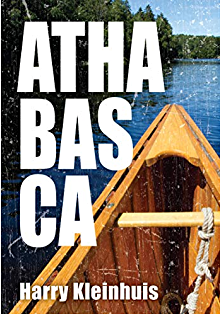Athabasca

Athabasca
Jack, age 14, escapes his family’s remote home beside Alberta’s Athabasca River by canoeing downriver, only to break an arm and require rescue by his father. But this leads to his father and him connecting in a new way.
Readers partial to a wilderness survival tale will like this novel. There are lots of authentic river crises, trapping scenes, hair-raising hunting incidents, a wolf chase and more. It’s clear the author knows his stuff and has spent time in the untamed wilderness.
The three of them watched the river flow by near the shore, and then looked to the farthest point beyond the bend. They could hear the river hiss over nearby gravel bars and gurgle in the eddying currents farther out. Even the small canoe would have been able to cover a hundred miles, traveling downstream, if it stayed in the stronger currents.
Given that it takes place between the Depression and World War II, there’s interesting historical perspective. And not a single paragraph shies away from showing how difficult a life in the wilds is, especially with an authoritarian, volatile father suffering from World War I shell shock. Besides, where else but in this novel would you learn that, if caught down a river with a hole in your canvas canoe, you just fry up some spruce gum and raccoon fat over the campfire and apply it in layers with strips of birch bark?
But readers expecting a coming-of-age story about a 14-year-old boy who runs away from his family’s log cabin to “find his freedom” may be disappointed.
The first hint of that is in the back-cover summary, which promises that, by the end, “Jack sees his father in a new light and Malcolm [the father] realizes Jack is coming of age.”
Yes, the father is referred to as Malcolm throughout, and much of the story is in his point of view (highly unusual in a young-adult book), and he arguably hijacks the novel early on. There’s a difference between an adult novel with a teenager in it, and a teen novel, and I’d label Athabasca the former.
The third-person point of view shifts constantly throughout, from Jack to his father, mother, younger brother and sister. There’s even one chapter (and the occasional paragraph) in the narrator’s point of view. This can work in the hands of a master writer crafting an adult novel, but it weakens this would-be teen novel. (In a scene where the mother and father are out of earshot of the kids and discussing whether they ever loved one another, I just shook my head.)
But, if you’re okay with it not being a typical young-adult book, and with the fact that the author clearly relates more to the father than the rest of the characters, it offers true backcountry adventure and characters you definitely come to care about.
The writing is on the stodgy side, with awkward case changes, too much passive tense, and metaphors and phrases that get repeated till they drive you up a wall (eagles leaving the nest, beaver dams breaking open, things “no one can understand if they weren’t there,” and “man of the house”).
In his runaway attempt, Jack doesn’t get far and is rescued almost immediately by his father.
Jack began to wonder what would happen next. He wondered if he should feel captured or rescued.
Jack’s father then gradually opens up about his war experiences and begins to treat Jack more like a man. Again, it’s more father-driven than son-driven, but Athabasca still offers a bracing story immersed in a wild, beautiful setting with good pacing and realistic action – and the reward of an uplifting ending.
Pam Withers is an award-winning author of more than 20 young-adult adventure novels, including Drone Chase. She lives in Vancouver, British Columbia, and is founder of www.YAdudebooks.ca.
